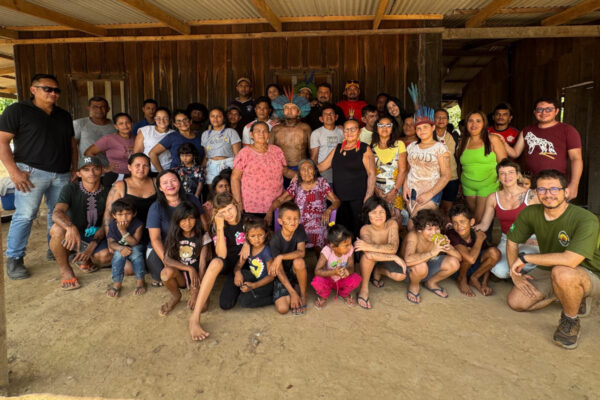Santarém, Brazil – Tensions are building over the Brazilian government’s polemic plans to circumvent the law in order to dam the Tapajós River. On November 27th, representatives of a diverse coalition of threatened indigenous peoples and other traditional communities assembled with religious leaders and activists to challenge a new Amazon mega-dam complex. The “Caravan to Resist Dams in the Amazon” unified forces among the indigenous Munduruku, riverbank communities, social movements and NGOs, with three bishops from the Brazilian Amazon including Erwin Krautler of the Xingu River, winner of the 2010 Right Livelihood Award. The protest marked the largest resistance action to date in the region and was held at in the remote São Luiz do Tapajós community, threatened with a mega-dam of the same name.
In a fresh act of defiance toward the Dilma Rousseff government’s authoritarian bearing and refusal to demarcate their ancestral territory Sawré Muybu, dozens of Munduruku warriors followed the Caravan by occupying the office of Brazil’s indigenous agency FUNAI in the town of Itaituba, near the proposed São Luiz do Tapajós dam site. Denouncing government intransigence and plans to flood Munduruku lands with the mega-dam, the warriors held FUNAI staff captive for the day, reaffirming demands that the government officially demarcate their territory.
Barring government proactivity, the Munduruku will continue to “auto-demarcate” Sawré Muybu, with the aim of defending their lands from illegal loggers and miners, as well as flooding by the proposed São Luiz do Tapajós Dam.
“Our struggle is large and dangerous, but we know we shall win,” said Munduruku Chief Suberanino Saw. “I’ve been to Belo Monte so I know what these dams represent: if they are built on the Tapajós they will flood our lands, and destroy our fish and hunting. We’ve come to put an end to this madness.”
“I come from the Xingu, where the rights of indigenous peoples and other communities have been trampled by the construction of the Belo Monte dam.,” said Bishop Krautler in a moving sermon during the ecumenical portion of the event. “We are here today because we are all responsible for caring for God’s creation; we cannot allow this physical and cultural destruction to be repeated in the Tapajós.”
A recent assertion by government Minister Gilberto Carvalho that the administration “will not desist from [damming] the Tapajós” sparked lively debate at the Caravan, where activists avowed determined resistance to block the dam project. “We will not desist from the beauty and life of the Tapajós, nor from our struggle,” said Enoe Sena of the Tapajós Alive Movement (MTV).
“Threatened communities have the right to say no, the right to a veto these dams,” said University of São Paulo Professor Célio Bermann. “Large Amazon dams are being imposed by a megalomaniacal government without considering alternatives, such as upscaling wind and solar power, and implementing energy efficiency measures that would render new dams unnecessary.”
“The government is perversely burning the Brazilian constitution while bypassing environmental law in order to speed [the dams] to auction,” said Father Edilberto Sena, coordinator of the MTV. “This Caravan is our response – we have managed to unite many diverse organizations who share the same desire, to defend the Tapajós.”
In an artistic act of resistance, 60 Munduruku and 10 activists preceded the Caravan with a symbolic action on a beach near the proposed São Luiz do Tapajós dam site, where they created a 219 foot rock banner in the sand spelling “Free Tapajós”.
The São Luiz do Tapajós is the largest of seven large dams slated for construction on the mainstream of the Tapajós and one of its tributaries, Rio Jamanxim. Dozens of other large and medium-sized dams are also planned for construction on the Teles Pires and Juruena rivers, major tributaries of the Tapajós, three of which are already under construction.
The majority of the projects would directly affect indigenous peoples and their territories, as well as other protected areas, including National Parks and National Forests, which is unconstitutional under Brazilian law.
Click here for more information in Portuguese on the Munduruku occupation of FUNAI and “auto-demarcation” process.













